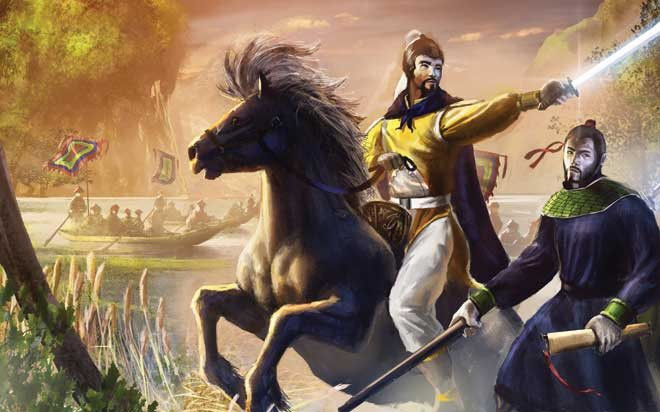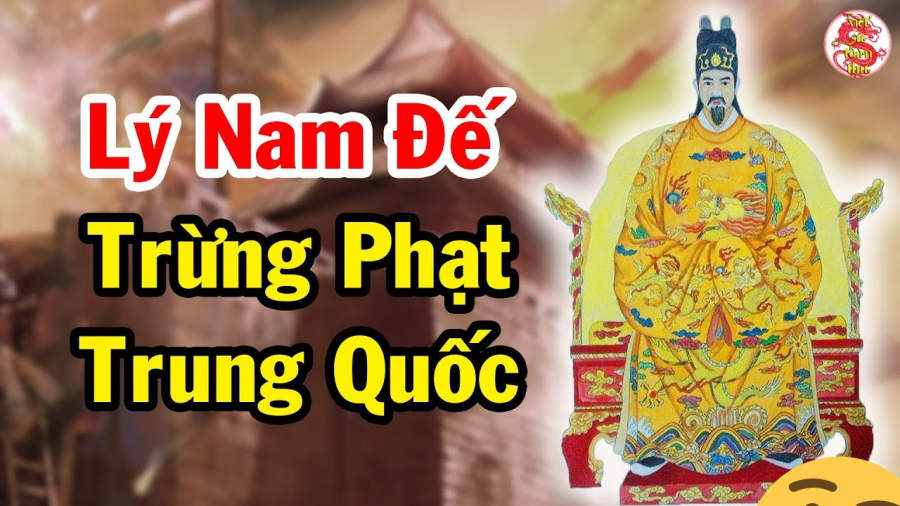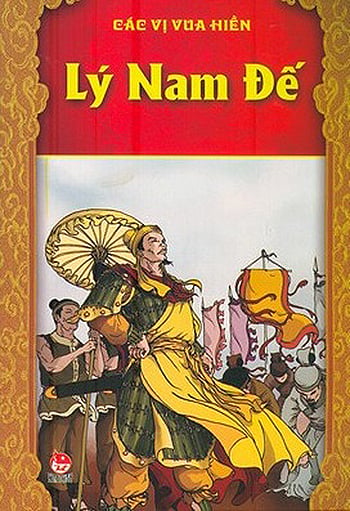Ly Nam De’s real name is Ly Bi or Ly Bon (born 503 – 548), originally from Tien Phong village (Thai Nguyen).
“Ly Nam De was the first emperor of our country, as he established his own dynasty as an affirmation of the enduring independence of our nation. This was also the first time in the history of the Vietnamese people that they built a new state structure following a centralized power system”, writes the book “54 Vietnamese Emperors”.

He was the son of a village chief but lost his parents at an early age and was brought up by a monk in a pagoda. Ly Bi therefore became a knowledgeable and deep-thinking person with talents in both literary and martial arts. He served as an official under the Northern regime of the Lương Dynasty but became disillusioned with their cruel rule and decided to abandon his position and raise an army.
“The king at that time served as the Commander-in-chief in Cửu Đức region (present-day Đức Thọ district, Hà Tĩnh province), and through alliances with heroes from different regions, he gained support. There was Triệu Túc, the chief inmate in Chu Dien (part of present-day Hai Duong province) who admired the king’s talent and virtue, leading an army to follow him. The provincial governor of Giao Chau, Lâm Vũ Hầu Tiêu Tư, knew about this and brought gifts to bribe the king, then fled back to Quảng Châu. The king went on to conquer the province (now Long Bien)”, writes the Đại Việt sử ký toàn thư (Complete Annals of Đại Việt).

In 542, the Lương Dynasty sent troops to invade Giao Chau, but Ly Bi, as the commander, led his generals to repel the enemy, causing them to suffer “a loss of 6-7 out of 10 soldiers, resulting in a scattered and defeated retreat”. In 543, King Lam Ap (the predecessor of the Champa state) launched an invasion, but was defeated by Ly Nam De’s generals.
The entire Giao Chau region (including the northern and central parts of present-day Vietnam and parts of Guangdong and Guangxi in China) came under the control of the Early Ly Dynasty.
“In the spring of 544, during the first lunar month, the king declared himself the Emperor of Nam Viet, established a reign, appointed hundreds of officials, created a national title, established a capital in Long Bien and built the Vạn Thọ palace to serve as the gathering place for his court”, wrote the book Đại Việt sử ký toàn thư. The Early Ly Dynasty had two divisions: civil and military. General Pham Tu led the military officials, while Tinh Thieu led the civil officials. Trieu Quang Phuc (later Triệu Việt Vương) served as the Grand General under Ly Nam De’s reign.

“Ly Bi – Ly Nam De was the first emperor of our country. He established his own dynasty as an affirmation of the enduring independence of our nation. This was also the first time in the history of the Vietnamese people that they built a new state structure following a centralized power system”, writes the book “54 Vietnamese Emperors”.
Van Xuan was the national title of Vietnam during a short period of independence from the Northern regime. Ly Nam De chose this name with the aspiration for eternal peace, national independence, prosperity, and transmission to future generations.
The Vạn Xuân dynasty lasted for 58 years, under the reign of 3 kings: Ly Nam De, Trieu Viet Vuong, and Ly Phat Tu (a relative of Ly Nam De).
According to the Đại Việt sử ký toàn thư, in 545, the Luong Dynasty appointed Dương Thiêu as the Governor of Giao Chau and Tran Ba Tien as the Prime Minister, and they sent troops to invade. Ly Nam De led a force of 30,000 soldiers to resist, but suffered multiple defeats, forcing him to retreat to Gia Ninh (present-day Phu Tho province). Tran Ba Tien’s forces continued to pursue and besiege him, resulting in the capture of Gia Ninh about six months later. The Early Ly Dynasty had to retreat deeper into the mountainous region inhabited by the Lao people in Tan Xuong.
“In the autumn, in the eighth month, the king led 20,000 troops from within Lao territory to station around Dien Triet Lake (Lap Thach district, Vinh Phuc province), with numerous boats tightly packed on the surface of the lake. The Luong troops were frightened and closed off the entrance to the lake, not daring to advance”, writes the book Đại Việt sử ký toàn thư.
However, taking advantage of the rising water levels that overflowed into the lake, Tran Ba Tien unexpectedly launched a surprise attack against the Ly forces, causing them to be defeated. The king retreated deep into Khuat Lao Cave (Tam Nong, Phu Tho) to reorganize his troops and launched a counterattack. It was here that Ly Nam De fell seriously ill and passed away in 548. Prior to that, he had entrusted the state affairs to the grand general Trieu Quang Phuc and commanded the army to fight against Ba Tien.
To commemorate Ly Nam De – the national hero who initiated the era of independence and self-rule of the country – people in many places have built temples in his honor. His name has been given to a street in Hanoi. In Thai Binh, “Ly Bon” is a major road in the city center of the province.
“Creating Lasting Memories: 10 Tips for Strengthening the Father-Child Bond”
Are you looking for effective ways to create a strong and close relationship with your child? If so, this article is for you! Find out 10 creative ways to nurture the father-child bond and make the relationship between you and your child more meaningful. These simple tips can help you create a special bond with your child and build strong emotional ties.
6 Secrets to Raising Independent and Happy Children: Learn from Dutch Parents
Dutch parents have a simple yet highly effective approach to child-rearing. They prioritize independence, resilience, and open communication in their children.



































